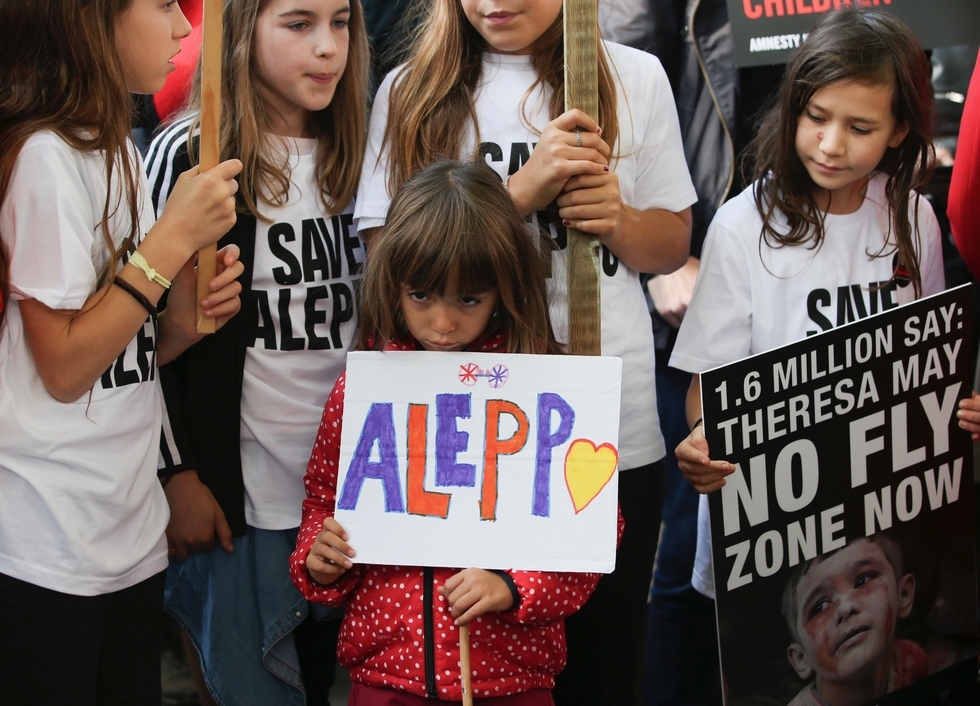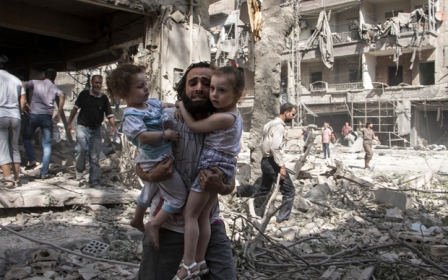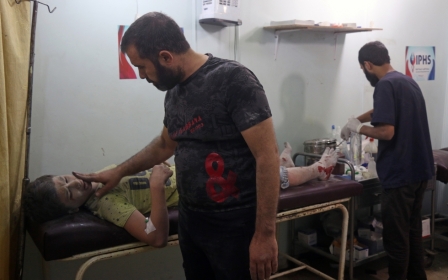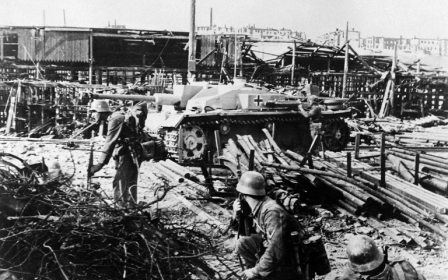Clashes, artillery fire erupt in Aleppo after Russian truce expires

Heavy clashes between government and rebel forces erupted in several areas of Syria's divided city of Aleppo late on Saturday after a unilateral ceasefire announced by government ally Russia expired.
Meanwhile, hundreds of people protested in London, calling for the government to end the bloodshed in the Syrian city.
Moscow had extended the unilateral "humanitarian pause" into a third day until 1600 GMT on Saturday, but announced no further renewal of the truce in spite of a UN request for more time to evacuate wounded civilians.
The Syrian Observatory for Human Rights reported fierce fighting in several areas along the front line dividing the city, as well as exchanges of artillery fire.
An AFP correspondent in rebel-held eastern districts also reported sounds of fighting and artillery fire.
Actor Carey Mulligan joined the London demonstration just opposite the gates to Downing Street, where teddy bears were later laid in a poignant message from campaigners about the human cost of the long-running conflict, the Guardian reported.
Mulligan said Britain could lead the way in efforts to address the plight of children caught up in the bitter war. The crowd included children wearing “Save Aleppo” T-shirts and other people carrying placards urging a “No-bomb zone now,” while some flew Syrian flags, the Guardian said.
Neither residents nor rebels in the opposition-held part of Aleppo heeded calls from Syria's army and Moscow to leave during the ceasefire, after weeks of devastating bombardment and a three-month government siege.
The pause began on Thursday, and came after Moscow announced a temporary halt to the Syrian army's campaign to recapture the divided city.
The army opened eight corridors for evacuations, but just a handful of people crossed through a single passage, with the others remaining deserted.
Ingy Sedky, spokeswomen for the International Committee of the Red Cross in Syria, told Deutsche Welle that evacuations were impossible because of the poor security situation in the city.
The team, Sedky added, was unable to enter rebel-held eastern Aleppo, which has been under siege since July, adding there was mortar shelling and sniper fire.
"Members of popular civil committees from regime districts entered the eastern neighbourhoods to try to evacuate the injured but failed," Observatory head Rami Abdel Rahman said on Saturday.
Syrian state media and Russian authorities have accused rebels in the east of preventing civilians from leaving and using them as "human shields".
Guarantees not received
More than 2,000 civilians have been wounded since the army launched its offensive to drive the rebels out of the eastern districts they have held since 2012. Nearly 500 people have been killed.
The UN had hoped to use the ceasefire to evacuate seriously wounded people and possibly deliver aid.
But a UN official said on Saturday the requisite security guarantees had not been received.
"You have various parties to the conflict and those with influence and they all have to be on the same page on this and they are not," said David Swanson, a spokesman for the UN humanitarian office.
The UN had drawn up a four-day plan that would start with two days of medical evacuations to west Aleppo, rebel-held Idlib province, and Turkey, and continue with more evacuations as well as aid deliveries.
No aid has entered Aleppo since 7 July and food rations will run out by the end of the month, UN chief Ban Ki-moon warned on Thursday.
The UN had asked Moscow to consider extending the pause until Monday evening, but there was no word of any extension as the 1600 GMT deadline passed.
'No third option'
Moscow accuses rebels of preventing civilians from leaving.
"The terrorists are using the ceasefire in their interests," said senior Russian military official Sergei Rudskoi.
"We are seeing them massing around Aleppo and preparing for another breakthrough into the city's western neighbourhoods."
Russia is a key ally of Syria's government and began a military intervention in support of President Bashar al-Assad last September.
Kremlin spokesman Dmitry Peskov said in an interview set to air Saturday evening that the intervention was meant to "liberate" Syria and keep Assad in power.
"Either Assad is in Damascus, or al-Nusra is," he said, referring to former al-Qaeda affiliate the Fateh al-Sham Front. "There is no third option here."
The Observatory said earlier that both rebel and government forces appeared to be reinforcing their positions.
"The regime and the rebels are both bolstering their forces, which raises fears of a massive military operation if the ceasefire fails," Abdel Rahman told AFP.
Elsewhere in Aleppo province, Turkish forces and allied Syrian rebels were shelling the Kurdish-Arab Syrian Democratic Forces coalition in several villages.
Turkey considers the Kurdish militia that leads the SDF to be a "terrorist" organisation, and began an operation in Syria in August targeting both it and the Islamic State group.
On Friday, a UN human rights council resolution called for "a comprehensive, independent special inquiry into the events in Aleppo".
It also demanded that warring parties provide unrestricted humanitarian access to desperate civilians and "end immediately all bombardments and military flights over Aleppo city".
Also on Friday, UN experts said the Syrian army was responsible for a March 2015 chemical weapons attack on the village of Qmenas.
But they said they were unable to determine who was responsible for two other chemical weapons attacks, one in the same month and the other in April 2014.
French Foreign Minister Jean-Marc Ayrault on Saturday urged the UN Security Council to issue a "clear condemnation" of chemical weapons use in Syria in a resolution "that places the perpetrators under sanctions".
Middle East Eye propose une couverture et une analyse indépendantes et incomparables du Moyen-Orient, de l’Afrique du Nord et d’autres régions du monde. Pour en savoir plus sur la reprise de ce contenu et les frais qui s’appliquent, veuillez remplir ce formulaire [en anglais]. Pour en savoir plus sur MEE, cliquez ici [en anglais].




